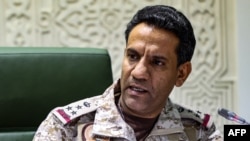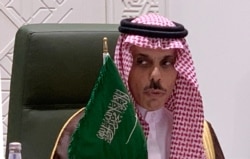Saudi Arabia proposed a cease-fire Monday in Yemen’s lengthy civil war, but Houthi rebels appeared to reject it, saying the offer was “nothing new” and did not go far enough.
In addition to a nationwide cease-fire, Riyadh said Sanaa airport would reopen. The airport is in Houthi-controlled territory, but the Saudi-led coalition which supports the government of Yemeni President Abd Rabbu Mansour Hadi, controls the air space and has blocked flights from coming and going for years.
The Saudis also said taxes and fees from Yemen’s Hodeidah seaport would be put into a joint account in Yemen’s Central Bank that both the government and the Iranian-backed rebels would have access to. Both sides agreed to this during negotiations in Stockholm in 2018, but had not fully implemented it, and the coalition as well as U.N. experts, had said the Houthis diverted millions of dollars. The funds would, in part, be used to pay long-overdue salaries to the country’s civil servants.
Political talks would follow, once the Yemeni parties agree.
"It is up to the Houthis now," Saudi Foreign Minister Prince Faisal bin Farhan Al Saud told reporters at a news conference in Riyadh. "The Houthis must decide whether to put their interests first or Iran's interests first."
President Hadi’s government welcomed the announcement, but the Houthis, who control nearly 70% of Yemen’s territory, were less enthusiastic.
“Any positions or initiatives that don’t take into consideration that Yemen is being subjected to an aggression and an embargo for the last six years, and which separates the humanitarian aspect from any military or political deal, and which does not lift the sanctions, makes it not serious and with nothing new in it,” Houthi spokesman Mohammed Abdulsalam said in a tweet.
The United Nations, which has appealed for a nationwide cease-fire for years and for an end to the blockade which has impacted the delivery of humanitarian aid, also welcomed the Saudi announcement.
“There is no doubt that every effort must be made to end the conflict in Yemen and address the suffering of the Yemeni people, and the United Nations looks forward to continuing its work with the parties to achieve this goal,” U.N. Spokesman Farhan Haq told reporters on Monday.
He said the Saudi proposal “aligns” with efforts of U.N. Special Envoy Martin Griffiths, who “has been working to secure a nationwide cease-fire, the reopening of Sana’a Airport to civilian air traffic, allowing additional fuel and commodities to enter Hodeidah Port and resuming a political process to end the conflict.”
Haq said Griffiths would follow up with all the parties, including the Houthis.
Last week in the U.N. Security Council, Griffiths warned that the recent escalation of a Houthi offensive on the strategic the city of Ma’rib, as well as fighting in Hajjah, Taiz and Hodeidah, had seen the war return “full force.”
Monday’s announcement in Riyadh followed a phone call between the Saudi foreign minister and U.S. Secretary of State Antony Blinken.
The two diplomats discussed their cooperation to support the efforts of both U.N. envoy Griffiths and U.S. Special Envoy Timothy Lenderking to end the conflict, “starting with the need for all parties to commit to a cease-fire and facilitate the delivery of humanitarian aid,” the State Department said.
The United States also reiterated its commitment to support Saudi Arabia’s defense and condemned recent attacks against Saudi territory.
The Houthis have escalated cross-border attacks recently, particularly drone and missile strikes, against civilian centers and oil infrastructure in neighboring Saudi Arabia.
More than six years of war has pushed the Middle East’s poorest country to the brink. The United Nations says 16 million Yemenis are going hungry, of which 5 million are one step away from famine. Some 50,000 people have already slipped into famine-like conditions.
The United Nations has asked for nearly $4 billion for Yemen’s humanitarian needs this year, but so far has received less than half the amount.









